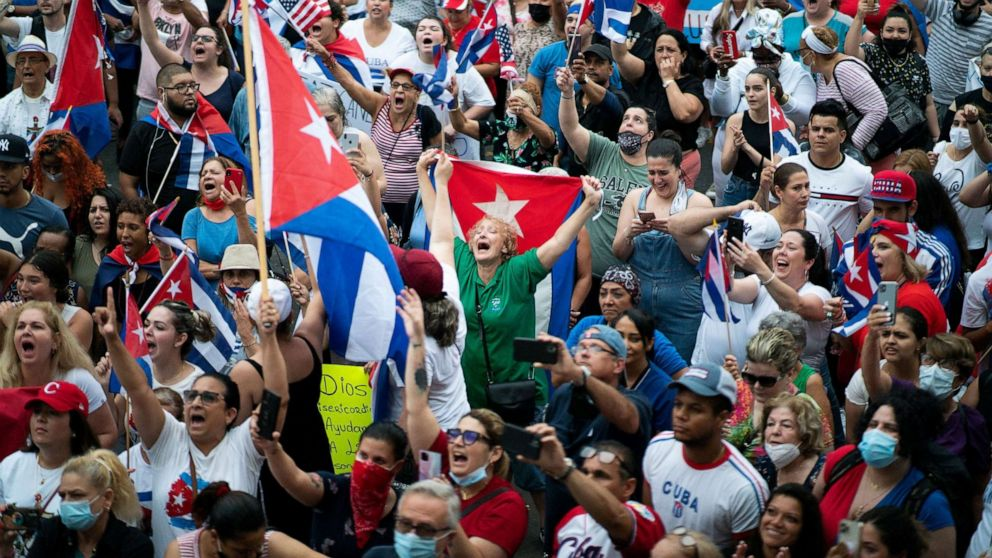What is Happening in Cuba?

Image courtesy of ABC News
By Noelia Veras
On July 11, protests triggered by a lack of resources amid the coronavirus pandemic and the country’s economic crisis began in Cuba. However, Cubans are also calling for an end to Cuba’s 62-year-old communist regime that has caused a constant lack of freedom and a lack of basic goods.
Thousands of people marched in Havana and other parts of the island, showing a rare moment of public anti-government sentiment in Cuba, considering the rest of the world has hardly been given access to life in Cuba and how heavy police and government control is on the island.
“We are not afraid! We are not afraid!” people shouted according to The Wall Street Journal. “Freedom! Freedom!”
According to a report from Reuters, Cuban President Miguel Díaz-Canel, who took office after Raúl Castro retired in 2018, blames the United States for political unrest due to “economic asphyxiation.” The Biden administration has voiced support for non-violent protests in Cuba.
“We stand by the Cuban people’s right for peaceful assembly. We call for calm and condemn any violence,” said Julie Chung, the State Department’s senior official in charge of Latin America.
According to NBC News, before becoming president, Díaz-Canel pushed for greater access to the internet in Cuba. Though more people have access to the internet, many websites highlighting the situation in Cuba have been blocked; citizens have resorted to using virtual private networks (VPNs) to access these sites. One website, ADN Cuba, recently posted a picture of Díaz-Canel that appeared to be a mugshot with the word “Genocide” underneath.
Many videos of police brutality during these protests have been circulating on the internet. Around 100 protestors have been arrested so far, according to activists, and hundreds of Cubans have waited outside of police stations to look for their missing family members.
“It’s becoming impossible to live here,” Havana resident Maykel (who declined to give his last name for safety reasons) said in reference to the protests. “I don’t know if this can happen again, because at the moment, Havana is militarized.”
These protests came at a time when Cubans experienced even more constraint when trying to access basic goods. With tourism going down due to increased coronavirus cases, Cuba’s economy has suffered. Cubans have to wait hours for basic goods and necessities and experience electricity outages for hours on end. The country’s health system is now more strained than ever due to the virus as well.
In an interview with NPR, University of Florida professor of Cuban history Lillian Guerra shared that these protests are not just about food shortages on the island; they also speak to the lack of economic resources. Guerra spoke of the negative consequences in Cuba after former president Donald Trump employed more economic sanctions against Cuba.
“I would like to see the Biden administration effectively reinstitute the openings to the embargo that Cuban citizens had been able to exploit to their own maximum reward,” Guerra said. “And by that, I mean, I’m 100% in favor of a greater free flow of ideas and travelers to Cuba. I think that we can reestablish the ability of Americans to send money to Cubans so that they can use that money for their own businesses in the private sector. We need to do something that is unexpected and it shows our friendship with the Cuban people and that will ultimately help them undermine the nature of this state.”
President Biden has addressed the situation.
“The United States calls on the Cuban regime to hear their people and serve their needs at this vital moment rather than enriching themselves,” Biden said.
Ultimately, the situation in Cuba remains dire, and there is no easy solution. However, even just the act of protesting on the island is historically significant on a global scale. For now it’s unsure what the fate of Cubans fleeing the island will be in the U.S. Alejandro Mayorkas, secretary of Homeland Security warned against Cubans fleeing to the U.S, since the “wet feet dry feet– the policy that allowed Cubans a fast track to become U.S. citizens– has not been in place since President Obama rescinded it in 2017 and Cubans would be considered undocumented.
“Allow me to be clear: if you take to the sea, you will not come to the United States,” Mayorkas said. “Anyone intercepted at sea, regardless of their nationality will not be permitted to enter the United States … To those who risk their lives doing so, this risk is not worth taking.”





